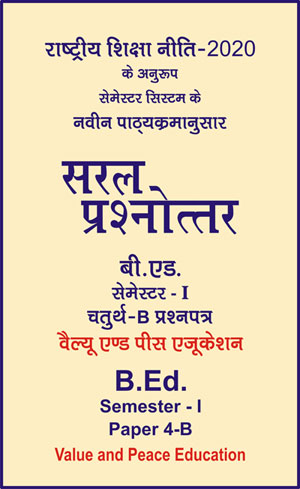|
बी एड - एम एड >> बी.एड. सेमेस्टर-1 प्रश्नपत्र-IV-B - वैल्यू एण्ड पीस एजुकेशन बी.एड. सेमेस्टर-1 प्रश्नपत्र-IV-B - वैल्यू एण्ड पीस एजुकेशनसरल प्रश्नोत्तर समूह
|
5 पाठक हैं |
||||||
बी.एड. सेमेस्टर-1 प्रश्नपत्र-IV-B - वैल्यू एण्ड पीस एजुकेशन (अंग्रेजी भाषा में)
Question- What can be done when parties are faced with moral differences that seem to be intolerable?
Answer -
Changing the Stories
In some cases, each party can heighten its understanding of the other’s world-view through new forms of communication. Some suggest that moral conflict be viewed as a particular form of communication and pattern of interaction. At various points in a moral conflict, people have the ability to handle their conflict differently. One way in which people can change the pattern of conflict is by telling different stories about what they are doing. By using narratives and story-telling to communicate they can enrich the views that each side has about the other, often revealing commonalities in the midst of all the differences.
Reframing
Third parties can sometime help the disputants to redefine or reframe their conflict, focusing more on attainable interests and less on non-negotiable positions or negative stereotypes. They can also help parties to seek mutually beneficial outcomes rather than competitive, win-lose outcomes. Even if the moral differences cannot be eliminated, sometimes the parties share interests or needs. All sides, for example, have a need for security, and increasing the feeling of security of one side does not diminish the security of the other side, as is commonly believed. Rather the opposite is generally true: the more secure one side feels, the less it feels a need to attack the other side; hence the more secure the other side is likely to feel. Therefore, reframing the conflict as a problem (at least in part) of security can sometimes help to get the parties to focus on something they can achieve together rather than on their non-negotiable differences.
Dialogue
Similar to story-telling, dialogue is a process of in-depth communication that allows parties to get to know each other better and to find commonalities with the other side. Although there are many forms and contexts of dialogue, all seek to replace the ubiquitous “diatribe” of moral conflicts with respectful communication, empathic listening, improved understanding, and respect. In some cases, these new forms of communication may help parties to see that their moral disagreements are less deep and fundamental than they previously thought. However, in other cases, the substantive issues will truly be beyond compromise.
Some suggest that in these sorts of cases, parties must strive to develop a space for citizenly public discourse. Even though the parties have radically different world-views and do not agree about the relevant issues, they can nevertheless reach an agreement about how to contend with moral and political differences in a constructive way. In other words, they can come to an agreement about how to disagree. They can thereby find a way to manage their conflict in a way that minimizes the costs to both parties.
|
|||||













